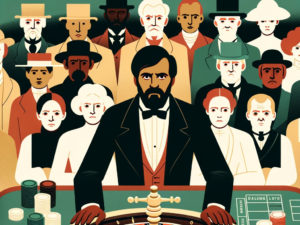Summary of “The Gambler” by Fyodor Dostoevsky, characters overview, interesting facts and more. It’s a novel about a young tutor in the employment of a formerly wealthy Russian general. The story reflects Dostoevsky’s own addiction to roulette. It explores themes of luck, risk, and the lure of gambling. It’s a compelling read, offering deep insights into human nature and the psychology of gamblers.
Short Summary
“The Gambler” follows Alexei Ivanovich, a tutor working for a Russian general. He’s in love with the general’s stepdaughter, Polina. Alexei becomes addicted to gambling, trying to win money to prove his worth to Polina.
 The story unfolds in a German town with a bustling casino. The general is awaiting a hefty inheritance from his wealthy aunt, Madame de Cominges. Alexei gambles away his savings, but then, surprisingly, wins a fortune.
The story unfolds in a German town with a bustling casino. The general is awaiting a hefty inheritance from his wealthy aunt, Madame de Cominges. Alexei gambles away his savings, but then, surprisingly, wins a fortune.
This sudden wealth changes his relationships. He confronts his love for Polina and realizes her manipulative nature. The general’s aunt arrives, dispelling hopes of inheritance. She gambles away a large sum, dying shortly after.
Alexei’s fortune vanishes as quickly as it came. He ends up with a fellow gambler, Blanche, moving to Paris. The story closes with him still addicted to gambling, a shadow of his former self. The novel starkly portrays the destructive nature of gambling and its impact on human relationships.
Comprehensive Plot Summary of “The Gambler”
Chapter 1
Alexei Ivanovich, a tutor, works for the Russian General. He’s in Roulettenberg, a fictional German town. The chapter introduces key characters, including Polina, the General’s stepdaughter, whom Alexei loves. Tensions in the General’s family and Alexei’s role are highlighted.
Chapter 2
Alexei becomes increasingly involved in the family’s affairs. The General’s obsession with his expected inheritance from Madame de Cominges is evident. Polina’s complex character unfolds, hinting at her control over Alexei.
Chapter 3
Alexei’s gambling begins, driven by Polina’s request to place a bet. This chapter showcases the casino’s environment and the thrill of gambling. Alexei’s initial reluctance turns into a fascination with roulette.
Chapter 4
Alexei continues gambling, experiencing the highs and lows. His relationship with Polina deepens, and her manipulation becomes clearer. Alexei’s observations of other characters in the casino add depth to the story.
Chapter 5
The General’s desperate financial situation is revealed. He is heavily in debt and dependent on the inheritance. Alexei’s bond with Polina strengthens, yet her intentions remain ambiguous.
Chapter 6
Madame de Cominges, the General’s wealthy aunt, arrives, shattering his hopes of inheritance. Her character is eccentric and commanding. The dynamics within the General’s family shift dramatically.
Chapter 7
Madame de Cominges gambles away a large sum, causing turmoil. Alexei is caught in the family’s chaos. His obsession with gambling intensifies, reflecting Dostoevsky’s critique of this addiction.
Chapter 8
Alexei wins a huge sum of money. This win changes his relationships, especially with Polina. His newfound wealth brings a false sense of power and freedom. The allure of gambling is at its peak.
Chapter 9
Alexei confronts his feelings for Polina. The illusion of their relationship crumbles, revealing her manipulative nature. Alexei’s disillusionment is a turning point in the novel.
Chapter 10
Madame de Cominges dies, ending any hope of inheritance. The General’s financial ruin becomes inevitable. Alexei’s reckless gambling continues, reflecting his inner turmoil.
Chapter 11
Alexei loses his fortune as quickly as he won it. His downfall is rapid and complete. The destructive nature of gambling is starkly portrayed.
Chapter 12
The story concludes with Alexei in Paris, accompanied by Blanche, another gambler. He is consumed by his addiction, a mere shadow of his former self. The novel ends with a powerful message about the dangers of gambling and its capacity to ruin lives.
Characters in “The Gambler”
Alexei Ivanovich
- Personality: Intelligent, introspective, and impulsive, especially when it comes to gambling and his feelings for Polina.
- Age: Not specified, but implied to be a young man.
- Gender: Male.
- Role: The protagonist and narrator. A tutor in the General’s household.
- Arc: He evolves from a passive observer to an active gambler, driven by his obsession with Polina and gambling. His journey is a downward spiral into addiction.
- Additional Notes: His character reflects Dostoevsky’s own struggles with gambling. His complex relationship with Polina and his addiction to roulette are central to the plot.
Polina Alexandrovna
- Personality: Enigmatic, manipulative, and emotionally complex.
- Age: Young, but exact age is not specified.
- Gender: Female.
- Role: The General’s stepdaughter. The object of Alexei’s affection.
- Arc: She remains somewhat mysterious throughout the novel. Her interactions with Alexei reveal her manipulative side.
- Additional Notes: Polina’s relationship with Alexei highlights themes of power, control, and the destructive nature of love.
The General
- Personality: Authoritative yet vulnerable, especially regarding his financial troubles and obsession with status.
- Age: Middle-aged.
- Gender: Male.
- Role: Head of the family. Employed Alexei as a tutor.
- Arc: His decline is evident as he awaits an inheritance that never comes.
- Additional Notes: His desperation for money and status drives much of the plot. His financial ruin is a critical element of the story.
Madame de Cominges
- Personality: Eccentric, unpredictable, and somewhat haughty.
- Age: Elderly.
- Gender: Female.
- Role: The General’s wealthy aunt. Her potential inheritance is a key plot point.
- Arc: Her arrival and subsequent death drastically impact the plot.
- Additional Notes: Her character introduces the theme of the futility and unpredictability of relying on fortune.
Blanche
- Personality: Cunning, self-interested, and somewhat flamboyant.
- Age: Not explicitly mentioned, but implied to be a young woman.
- Gender: Female.
- Role: A gambler who becomes involved with Alexei.
- Arc: Her character doesn’t evolve significantly but plays a crucial role in the story’s conclusion.
- Additional Notes: Blanche represents the seductive and destructive aspects of the gambling world. Her relationship with Alexei signifies his complete surrender to his addiction.
Marquis Des Grieux
- Personality: Cunning and manipulative.
- Age: Not explicitly mentioned, but appears to be middle-aged.
- Gender: Male.
- Role: A scheming Frenchman interested in the General’s family, particularly in marrying Polina for her expected inheritance.
- Arc: He represents the opportunistic individuals who circle the General, waiting to capitalize on his financial downfall.
- Additional Notes: His interactions with the family add to the themes of greed and deception.
Mr. Astley
- Personality: Reserved, observant, and somewhat mysterious.
- Age: Not specified, but appears to be a young or middle-aged man.
- Gender: Male.
- Role: An Englishman who befriends Alexei and has a quiet affection for Polina.
- Arc: He serves as a contrast to the other more impulsive characters, often providing a more rational perspective on events.
- Additional Notes: His character adds a layer of stability and moral integrity to the narrative.
Mlle. Blanche
- Personality: Calculating and self-serving.
- Age: A young woman.
- Gender: Female.
- Role: A Parisian woman of questionable morals who becomes romantically involved with the General and later with Alexei.
- Arc: Her character showcases the themes of manipulation and the exploitation of others’ weaknesses.
- Additional Notes: Her relationships with the General and Alexei highlight the vulnerabilities of both men.
Potapych
- Personality: Loyal and dutiful.
- Age: Not specified, likely older.
- Gender: Male.
- Role: The General’s servant.
- Arc: A minor character, but his loyalty to the General contrasts with the self-serving attitudes of others.
- Additional Notes: His character adds depth to the General’s household and the varying dynamics within it.
Additional Info And Interesting Facts About The Gambler
Context
“The Gambler” was influenced by Dostoevsky’s own gambling addiction. Written under financial pressure, it reflects his personal experiences in European casinos. This work also mirrors the socio-economic realities of 19th-century Europe.
Comparison with Other Works
Compared to “Crime and Punishment” or “The Brothers Karamazov“, “The Gambler” is less philosophically profound but equally insightful into human psychology. It shares themes of desperation and moral conflict.
Reception and Criticism
Initially, “The Gambler” received mixed reviews. Over time, it gained recognition for its psychological depth and honest portrayal of gambling addiction. It’s now seen as a significant, though lesser-known, work of Dostoevsky.
Comparative Analysis
“The Gambler” contrasts with contemporary Victorian novels in its darker exploration of human nature. Unlike the idealized portrayals common then, Dostoevsky presented flawed, complex characters.
Adaptations
- Film: “The Gambler” (1974), starring James Caan, although loosely based.
- Opera: “The Gambler” by Sergei Prokofiev, closely following the novel’s plot.
- Film: “The Great Sinner” (1949), a loose adaptation starring Gregory Peck and Ava Gardner.
My Take on “The Gambler”
“The Gambler” is more than a narrative on gambling addiction; it’s Dostoevsky’s veiled rebellion against the rigid structures of 19th-century Russian society. Through Alexei’s descent into gambling, Dostoevsky critiques not just individual moral failings, but the broader societal flaws: a fixation on wealth and status, and the spiritual emptiness of a society obsessed with material gain.
This novel can be seen as a prophetic warning about the dangers of unchecked capitalism and societal decadence. In this light, “The Gambler” is a radical, almost revolutionary work, subtly undermining the very foundations of its contemporary social and economic systems. It’s not just a story of a man ruined by addiction, but a mirror reflecting a society gambling away its moral and ethical values.
Tell us what you think! 🎰 Is Dostoevsky a master of the human psyche or just spinning the roulette wheel of literature? 💭📚 Share your thoughts below! 👇


Comments